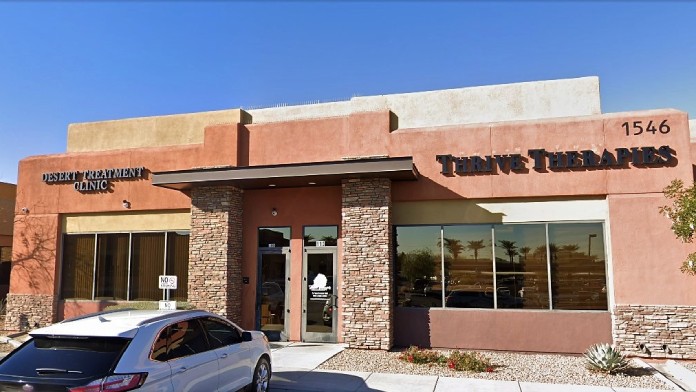Desert Treatment Clinic

About Desert Treatment Clinic
Medication assisted treatment (MAT) has been a lifeline for countless people battling opioid addiction since the 1960s. This trusted and research-backed approach helps patients break free from opioid dependence by pairing FDA-approved meds with counseling. If you’re seeking long-term healing from opioid addiction in Henderson or anywhere across Clark County, Desert Treatment Clinic can help. They’re situated east of Cornerstone Park and northwest of Henderson Events Plaza in Henderson, Nevada.
Folks from this local community and surrounding areas trust Desert Treatment Clinic for compassionate and effective support. The clinic also helps patients address underlying psychiatric challenges, such as depression or PTSD which often co-occur with opioid dependence. They even offer coordinated and specialized support for pregnant women in recovery with an emphasis on the safety and health of the infant. Guest dosing services are also available for individuals who’re away from their home clinic.
Medication-Supported Recovery for Long-term Healing
Desert Treatment Clinic offers personalized treatment planning as a vital step in their MAT program. We also like that they’ve multiple FDA-approved meds available to ease painful withdrawal symptoms and curb physiological cravings. You’ll then attend counseling sessions to address underlying trauma and emotional challenges contributing to your opioid dependence while building effective strategies to prevent relapse.
The program incorporates psychotherapy and may include psychiatric medication management to tackle co-occurring mental health challenges. Their wraparound care includes personalized discharge planning and ongoing support. They may even link you to community or county services to address varying personal needs from housing and employment to transportation and education.
| Levels of Care | Detox Service Setting | Programs | Payment Options |
|---|---|---|---|
|
Inpatient and residential programs provide round-the-clock medical and emotional support as you live at the treatment facility. This level of care may be recommended if you have severe addictions or mental health conditions since it removes outside distractions and allows you to focus solely on therapy. |
In outpatient therapy, you’ll attend therapy sessions several times each week while living at home. This is ideal if you have a strong support system and a lower risk of relapse. Outpatient treatment offers flexibility to maintain work, school or family obligations. |
||
|
Inpatient detox occurs in a dedicated treatment facility. You’ll live there around the clock and receive intensive medical support and supervision to help manage your withdrawal symptoms. It is suitable for individuals with moderate to severe addictions as it ensures a stable detox environment. |
Outpatient detox gives you access to medically supervised withdrawal services while still allowing you to live at home. You’ll attend a clinic for treatment and monitoring. This flexible option is suitable for those with mild to moderate withdrawal symptoms who have strong support systems. |
||
|
Alcohol detox programs offer medical support to help individuals withdraw safely from alcohol. Your care team may use medications to ease your symptoms and provide medical monitoring to address complications. |
Drug detox programs support individuals who are withdrawing from addictive substances like cocaine and heroin. Medical support helps you manage symptoms in a controlled and safe environment so you can achieve initial sobriety. |
||
|
Private Insurance
|
Self Pay
|
Levels of Care
Inpatient and residential programs provide round-the-clock medical and emotional support as you live at the treatment facility. This level of care may be recommended if you have severe addictions or mental health conditions since it removes outside distractions and allows you to focus solely on therapy.
In outpatient therapy, you’ll attend therapy sessions several times each week while living at home. This is ideal if you have a strong support system and a lower risk of relapse. Outpatient treatment offers flexibility to maintain work, school or family obligations.
Detox Service Setting
Inpatient detox occurs in a dedicated treatment facility. You’ll live there around the clock and receive intensive medical support and supervision to help manage your withdrawal symptoms. It is suitable for individuals with moderate to severe addictions as it ensures a stable detox environment.
Outpatient detox gives you access to medically supervised withdrawal services while still allowing you to live at home. You’ll attend a clinic for treatment and monitoring. This flexible option is suitable for those with mild to moderate withdrawal symptoms who have strong support systems.
Programs
Alcohol detox programs offer medical support to help individuals withdraw safely from alcohol. Your care team may use medications to ease your symptoms and provide medical monitoring to address complications.
Drug detox programs support individuals who are withdrawing from addictive substances like cocaine and heroin. Medical support helps you manage symptoms in a controlled and safe environment so you can achieve initial sobriety.
Contact

Chika Uchendu is a multi-niche and seasoned SEO writer with expertise in personal finance, technology and health. He’s had over 10 years of experience creating impactful content that resonates with diverse audiences. His journalism and digital marketing background enables him to combine data-driven analysis with engaging storytelling. This helps drive engagement and grants target audiences access to valuable information.
Chika has worked for Benzinga, Motley Fool, Webopedia and many other popular online media outlets on a freelance and contractual basis. He is using his voice to drive awareness and meaningful change among people dealing with the pandemic of substance use disorder. Chika is an ambivert who enjoys sports, hiking, reading and video gaming.

Peter W.Y. Lee is a historian with a focus in American Cold War culture. He has examined how popular culture has served as a coping mechanism for the challenges and changes impacting American society throughout the twentieth century.




